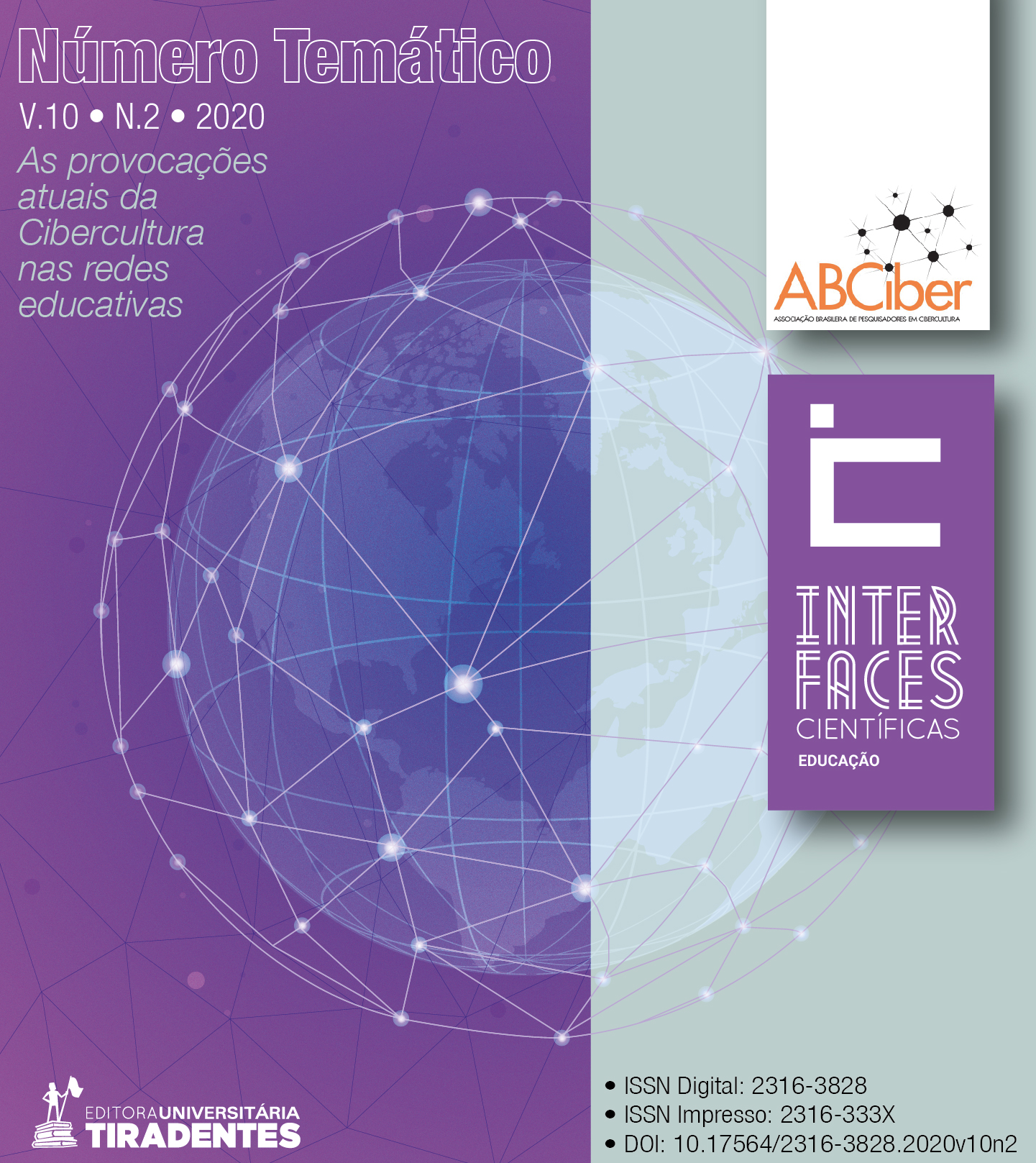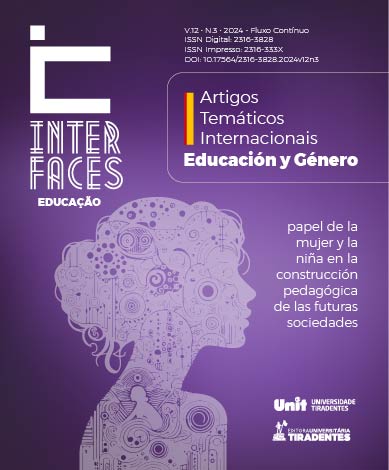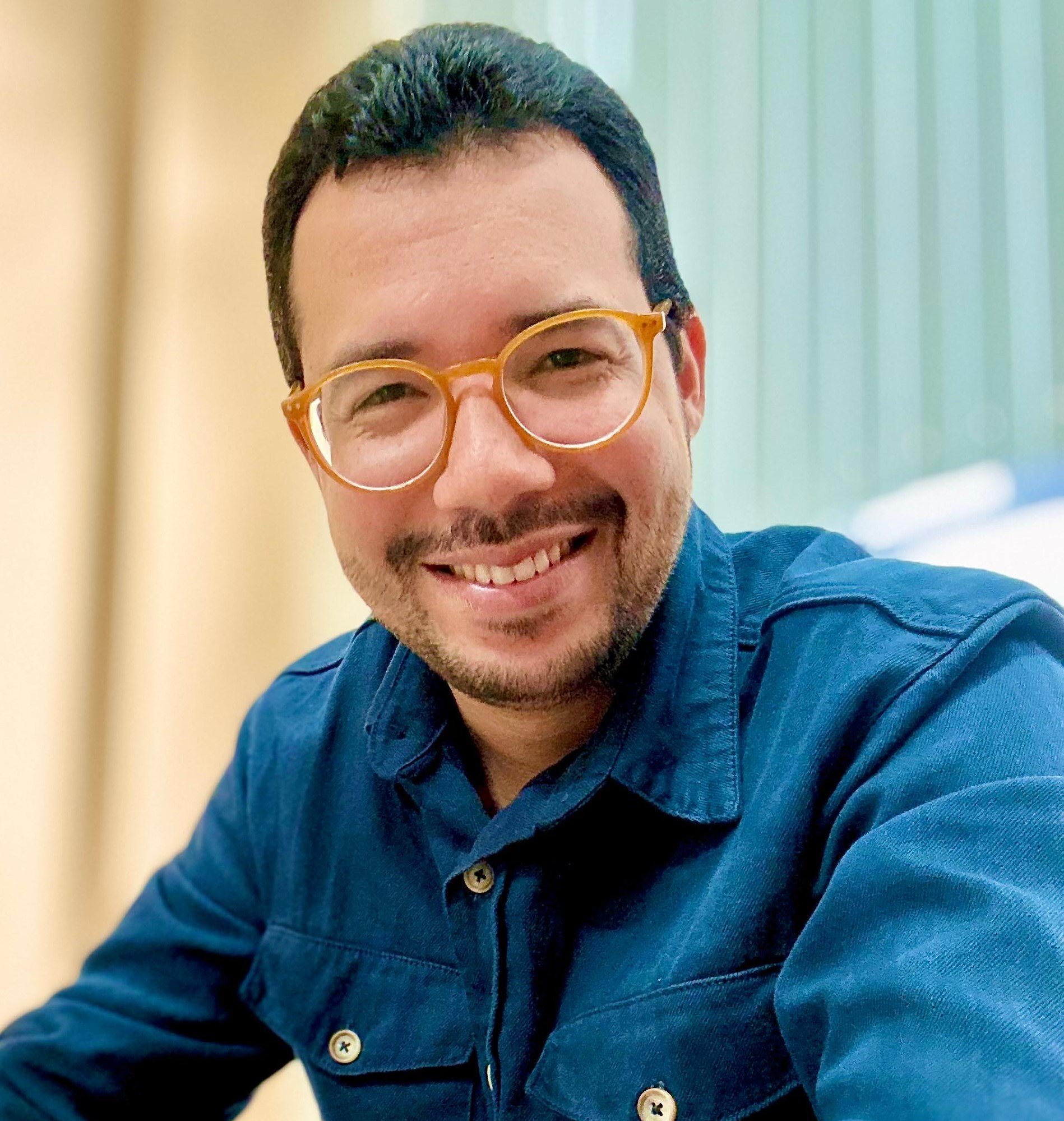RELAÇÕES SOCIOTÉCNICAS DO MOVIMENTO ESCOLA SEM PARTIDO PARTIR DE UMA ANÁLISE PÓS-QUALITATIVA
DOI:
https://doi.org/10.17564/2316-3828.2020v10n2p80-94Palavras-chave:
Sociomaterialidade, Teoria Ator-Rede, Movimento Escola sem Partido, Pesquisa Pós-Qualitativa.Publicado
Downloads
Downloads
Edição
Seção
Licença
A Revista oferece acesso livre e imediato ao seu conteúdo, seguindo o princípio de que disponibilizar gratuitamente o conhecimento científico contribui para a democratização do saber. Assume-se que, ao submeter um artigo, o(a) autor(a) se reconhece como detentor(a) do direito autoral sobre ele e autoriza seu livre uso pelos leitores, podendo ser, além de lido, baixado, copiado, distribuído e impresso.Resumo
Este artigo traça as relações sociotécnicas no Movimento Escola sem Partido a partir de uma visão pós-humana e da análise pós-qualitativa, utiliza como arcabouço teórico a Actor-Network Theory, que começa com o foco na materialidade e é alimentada pela observação que os humanos não são/estão totalmente no controle das práticas, mas apoiada pela suposição de que os objetos/coisas também participam e contribuem para a formação delas. Aplicamos a metodologia pós-qualitativa, mostrando que a produção de fatos científicos não partem apenas dos humanos, mas sim das associações e das mixagens das entidades. Aquele que age e se movimenta, modifica o cenário e deixa rastros, de modo que cabe ao pesquisador descrever as marcas deixadas pelos atores (humanos e não-humanos), delineando as conexões existentes entre eles. Esse conhecimento é determinado, produzido e visível através dessas conexões.Como Citar
Referências
BENNERTZ, R. Constituindo coletivos de humanos e não humanos: a ordenação do mundo. História, Ciências, Saúde – Manguinhos, Rio de Janeiro, v. 18, n. 3, p. 949-954, 2011.
BENNETT, J. Thing-Power. In: BRAUN, B.; WHATMORE, S. J. Political Matter: Technoscience, Democracy, and Public Life. Minnesota: Univerversity of Minnesota Press, 2010a. p. 35-62.
BUHL, H.; ANDERSEN, M.; KEROSUO, H. I Work All Day with Automation in Construction: I am a Sociomaterial-Designer. In: NORDIC CONFERENCE ON CONSTRUCTION ECONOMICS AND ORGANIZATION, 10., 2019. Disponível em: https://www.researchgate.net/publication/334613019_I_Work_All_Day_with_Automation_in_Construction_I_am_a_Sociomaterial-Designer. Acesso em: 2 jun. 2019.
DUIJN, M. Network Society and Public Policy Networks. In: DUIJN, M. Embedded Reflection on Public Policy Innovation: A Relativist/Pragmatist Inquiry into the Practice of Innovation and Knowledge. [S.l]: Eburon Academic Publishers, 2009. p. 79-84. Disponível em: http://ebookcentral.proquest.com/lib/bcufpb-ebooks/detail.action?doc. Acesso em: 10 fev. 2017.
FOX, N. J.; ALLDRED, P. Social structures, power and resistance in monist sociology: (new) materialist insights. Journal of Sociology, v. 54, n. 3, p. 315-330, 2018.
GEIGER, R. S.; RIBES, D. Trace ethnography: Following coordination through documentary practices. 2011. Disponível em: https://www.researchgate.net/publication/224221205_Trace_Ethnography_Following_Coordination_through_Documentary_Practices. Acesso em: 19 jan. 2019.
GERRARD, J.; RUDOLPH, S.; SRIPRAKASH, A. The Politics of Post-Qualitative Inquiry: History and Power. Qualitative Inquiry, v. 23, n. 5, p. 384–394, 2017.
GREENE, J. C. On rhizomes, lines of flight, mangles, and other Assemblages. International Journal of Qualitative Studies in Education, v. 26, n. 6, p. 749-758, 2013.
HARMAN, G. Prince of networks: Bruno Latour and metaphysics. Melbourne: Re. Press, 2009.
KANGER, L. Mapping the ANT multiple: A comparative, critical and reflexive analysis. J. Theory Soc Behav. v.47, p. 435–462, 2017.
LAET, M.; MOL, A. The Zimbabwe Bush Pump: Mechanics of a Fluid Technology Source. Social Studies of Science, v. 30, n. 2, p. 225-263, 2000.
LATOUR, B. Jamais fomos modernos: ensaio de antropologia simétrica. Rio de Janeiro: 34, 1994a.
LATOUR, B. Por uma antropologia do centro. Revista Mana, Rio de Janeiro, Ano X, n.2, p.397-414, out. 2004.
LATOUR, B. Reagregando o Social: uma introdução à teoria do Ator-rede. Salvador: Edufba, 2012.
LE GRANGE, L. What is (post)qualitative research? South African Journal of Higher Education, v. 32, n. 5, p. 1-14, 2018.
LEONARDI, P. M. Materiality, Sociomateriality, and Socio-Technical Systems: What Do These Terms Mean? How Are They Related? Do We Need Them? In: LEONARDI, P. M; NARDI, B. A.; KALLINIKOS, J. (Eds.). Materiality and Organizing: Social Interaction in a Technological World. Oxford: Oxford University Press., 2012. p. 25-48.
LIMA, N. W.; OSTERMANN, F.; CAVALCANTI, C. J. H. A não-modernidade de Bruno Latour e suas implicações para a Educação em Ciências. Caderno Brasileiro de Ensino de Física, v. 35, n. 2, p. 367-388, 2018.
LONGO, M.; ZACKA, B. Political Theory in an Ethnographic Key. American Political Science Review, v. 113, n. 4, p. 1066-1070, 2019.
MAZZEI, L. A. A voice without organs: interviewing in posthumanist research. International Journal of Qualitative Studies in Education, v. 26, n. 6, p. 732-740, 2013.
MONTEIRO, M. S. A. Reconsiderando a Etnografia da Ciência e da Tecnologia: tecnociência na prática. Revista Brasileira de Ciências Sociais, v. 27, n. 72, p.139-151, 2012.
MÜLLER, M. Assemblages and Actor-Networks: rethinking socio-material power, politics and space. Geography Compass, v. 9, n. 1, p. 27-41, 2015.
ROSA, L. O.; FERREIRA, V. S.; SILVA, S. C. V. Elaboração e análise de redes de política. Revista de Estudios Teóricos y Epistemológicos en Política Educativa, v. 5, p. 1-12, 2020.
SCHUBERT, C. Akteur-Netzwerk Theorie. In: APELT, M. et al. (Orgs.). Handbuch Organisationssoziologie. 2019. Disponível em: https://link.springer.com/referenceworkentry/10.1007%2F978-3-658-15953-5_16-1. Acesso em: 4 ago. 2019.
SEGATA, J. A Etnografia como Promessa e o “Efeito Latour” no Campo da Cibercultura. Ilha, v. 16, n. 2, p. 69-87, 2014.
SØRENSEN, E. The Materiality of Learning: Technology and Knowledge in Educational Practice. Cambridge University Press, 2009.
ST. PIERRE, E. A. Writing Post Qualitative Inquiry. Qualitative Inquiry, v. 24, n. 9, p. 603–608, 2018a.
ST. PIERRE, E. A. Uma história breve e pessoal da pesquisa pós-qualitativa: em direção à “pós-investigação”. Práxis Educativa, Ponta Grossa, v. 13, n. 3, p. 1044-1064, set./dez. 2018b. Disponível em: https://www.revistas2.uepg.br/index.php/praxiseducativa. Acesso em: 5 jan. 2019.
TAYLOR, C. A. Is a posthumanist Bildung possible? Reclaiming the promise of Bildung for contemporary higher education, Higher Education, v. 74, n. 3, p. 419-435, 2017.
ULMER, J. B. Posthumanism as research methodology: inquiry in the Anthropocene. International Journal of Qualitative Studies in Education, 2017. Disponível em: http://www.ufrpe.br/sites/www.ufrpe.br/files/ulmer_2017._posthumanism_as_research.pdf. Acesso em: 4 out. 2019.
VIEIRA, B. M. A etnografia como metodologia de análise da política: dilemas e perspectivas do trabalho de campo. Revista Magistro, v. 2, n. 14, p. 88-106, 2016.


















